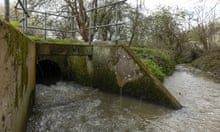The three rivers designated for swimming in England have all been given “poor” status in newly published government water quality figures.
Data released by the Environment Agency on Friday showed that during the 2023 bathing season 96% of bathing waters in England met minimum standards, with 90% of bathing waters in England being rated as “good” or “excellent”. This was a decline from the previous year’s statistics that showed that 97% met the minimum standard of “sufficient”, while 93% met the highest standards of good and excellent.
The vast majority of designated bathing sites are coastal, and only three rivers in England have the special designation for swimming: the River Wharfe at Ilkley, Wolvercote Mill Stream in Oxfordshire and the Deben estuary at Waldringfield. All three have been given poor status, meaning people should not swim in them and risk getting sick if they do. Sewage spills and agricultural runoff mean that swimming sites can carry E coli and intestinal enterococci, which would make swimmers ill.
Many European countries designate a far greater number rivers as swimming areas. In France, for example, there are more than 570 river bathing sites.
The chief executive of the campaign group River Action, James Wallace, said: “Only three rivers have designated bathing water status and they are all rated poor, the worst rating possible. Sadly, that tells its own story, that the UK’s rivers are in a very fragile state. Today, only 14% of the UK’s rivers are considered healthy. Many others like the iconic River Wye are so polluted they are at risk of ecocide.”
The data is focused solely on the 400 sites designated for swimming during the spring and summer months, from 15 May to 30 September. These are usually the driest times of year, when sewage is least likely to be spilled, as overflows are supposed to happen only during heavy rain when sewers are overwhelmed. However, analysis has found that water companies sometimes dump sewage during dry weather when they are not legally supposed to.
A recent report by Surfers Against Sewage found that most popular bathing sites had unsafe levels of sewage, and the Liberal Democrats revealed this summer that human waste was dumped near many of Britain’s best beaches. There are fears that the situation could deteriorate further because the government plans to diverge from EU water quality standards.
At this rate, the government will not meet its water quality standards, with all UK water bodies supposed to be rated at least good by 2027. The Labour party has promised to fix the issue by imposing stricter rules on water companies, including banning bonuses for those that continue to pollute and ensuring water bosses face personal criminal liability for sewage dumping.
The shadow environment secretary, Steve Reed, said: “The water industry is broken after 13 years of Tory government – with stinking, toxic sewage lapping up on our rivers, lakes, and seas. It is disgusting that families and children cannot enjoy these waters without the threat of getting sick. Despite this gross negligence, consumers are now expected to pay higher water bills, whilst CEOs are pocketing millions in bonuses.”
after newsletter promotion
The government has defended its record on water quality. The water minister, Robbie Moore, said: “Our bathing waters have improved significantly in recent years, and we are fully committed to seeing the quality of our coastal waters, rivers and lakes rise further for the benefit of the environment and everyone who uses them.
“Our Plan for Water is delivering more investment, stronger regulation, and tougher enforcement to clean up our waterways and continue to improve our bathing waters. We have also set stringent targets for water companies to reduce sewage spills from storm overflows which frontloads action at designated bathing waters to make the biggest difference to these sites as quickly as possible.”









